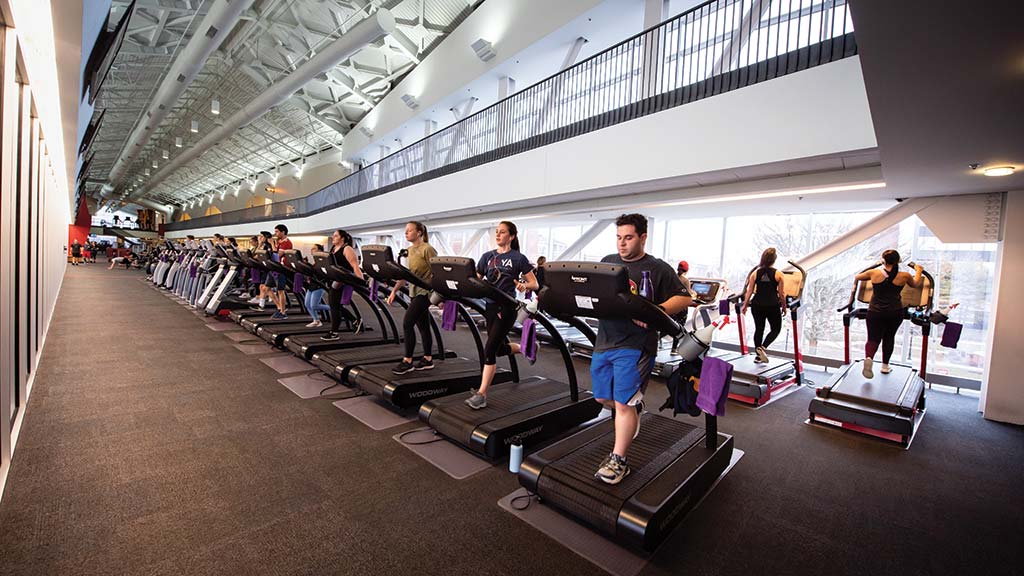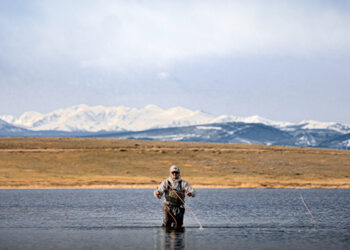When David Kirk was a graduate assistant at Illinois State University (ISU), he conducted a research project on gaming.
Dawn Pote, the executive director of Campus Recreation and the Student Fitness Center, remembered this when ISU came to her about moving forward with an esports program. “I frankly called David and said, ‘They’ve talked to me about doing esports,’” recalled Pote. “‘And while I think it’s a fantastic idea, what do I need to know? And how does this come together?’ David gave me a crash course on what to look at and where to go.”
So, ISU became the first public institution in the state of Illinois with a varsity esports program. Plus, Kirk returned as the esports program director in early 2020, right before the COVID-19 pandemic hit. “The pandemic took us from what we thought was going to be a soft launch into a boom,” said Pote.
That boom has escalated over the past two years as Redbird Esports has risen to a prominent position in collegiate esports. In fact, their Overwatch team won Overwatch Contenders, a semi-pro tournament series in September 2021.
The Four Pillars of Redbird Esports
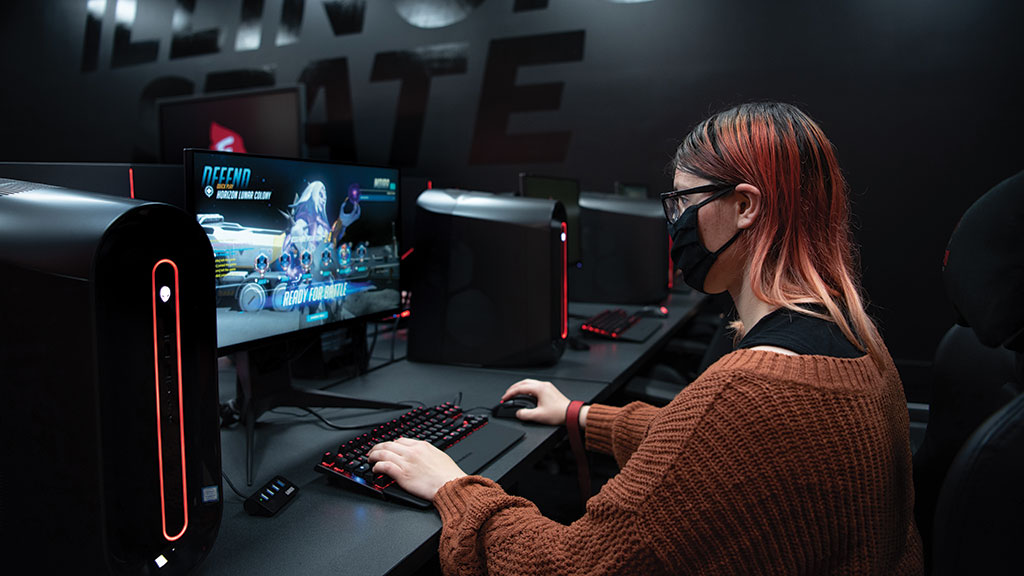
While the varsity esports program means scholarships, dedicated space and coaching, academic support expectations, and a fitness program requirement, there are actually four pillars to Redbird Esports. “We’re not just a competitive team; we’re a holistic program with multiple ways to engage if you’re a student and are interested in esports and gaming,” said Kirk. “We built our program on four key pillars: competition, club, casual and career.”
Each of the four pillars exist in the same space known as The Vault, which has:
- 25 high-performance gaming PCs
- Alienware gaming monitors
- Custom gaming chairs
- SteelSeries keyboards, mouse and headset
- A variety of pre-installed games.
The competitive varsity level includes League of Legends, Overwatch and Rocket League.
In terms of the club pillar, within the first year it had 18 clubs serving about 1,000 students. This incorporates other aspects of gaming like tabletop clubs, a board game club, an anime club, a game design club, etc. In terms of the casual element, there are 15 hours a week that The Vault is open for walk-in play. In the fall semester of 2021, Pote said they saw 700 people walk through the door during the semester.
“That casual aspect is bringing people out of the residence hall rooms and into an environment where they can interact with other folks, building the overall social capital for campus,” said Pote, noting this is an area they are looking to grow.
EXTRA CREDIT: David Jachimowicz at Millersville University’s Campus Recreation shares on spearheading the intramural esports program.
Lastly, the fourth and final pillar is career. “Esports isn’t just about playing games,” said Kirk. “There is an entire multi-billion-dollar industry surrounding it. We’re providing students real-world skills and experience to be able to enter the industry once they graduate.”
Students in the game design program and creative technology school at ISU have been engaged by the Redbird Esports program. Plus, Kirk said the students who make it all possible are getting a large amount of experience to take with them.
“As the only full-time staff member dedicated to esports — with the help of a part time graduate assistant, Jack Blahnik — we rely heavily on our students to lead a number of initiatives within the program,” said Kirk. “Whether they’re building and developing a registered student organization dedicated to a single game title or genre, or setting up our broadcast and production for streaming and running our social media channels, they take on a lot of responsibility and excel at it.”
Overcoming Challenges
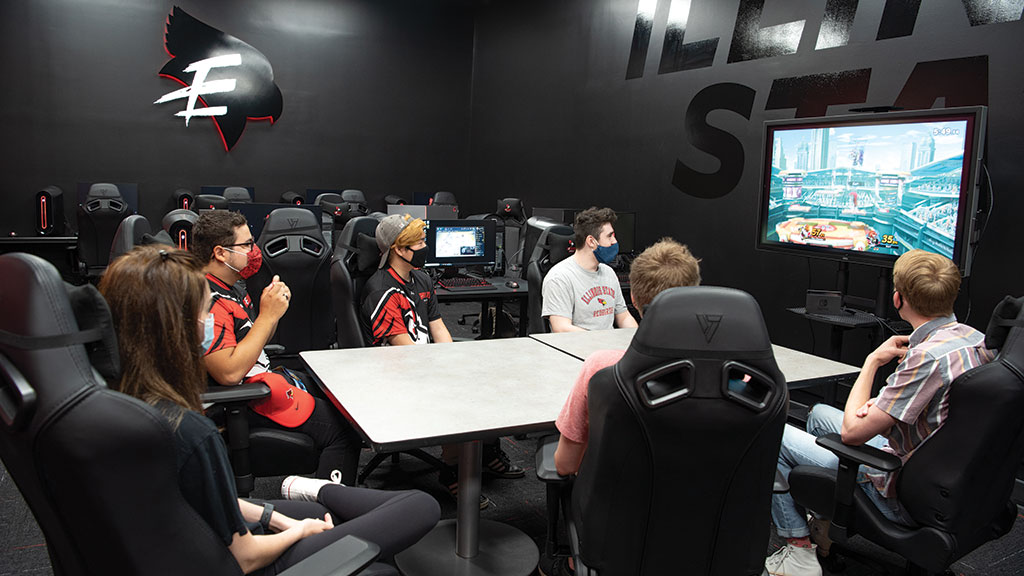
However, like any program, ISU Redbird Esports has had its challenges. First was getting everyone onboard.
Matt Seibring, an associate director of Campus Recreation, said he didn’t know a thing about video games and needed to be educated himself on the world of gaming. “A lot of people do not think and still do not think it makes sense,” he said. “There was a lot of education that had to go into some individuals to get them onboard.”
A large piece to their success in this was the partnership with Admissions. Seibring explained how that department had been getting information from university applicants about their desire for esports. “The number of students applying to this campus who had some sort of interest was really astronomical,” said Seibring. “So, them having that information for us was definitely helpful in trying to change the mind and educate some of these people who, to be honest, had the same mindset about video games as I did two or three years ago.”
In fact, the Illinois High School Association now includes esports as activities they support. “If we know our students are coming with that interest and that idea, we have got to get up to speed because they’re coming with an expectation of doing that,” said Pote. “Having those great partners in Admissions that will connect us quickly to those students and push out our information has been make or break for us.”
And that’s what Redbird Esports represents in the larger scheme of things: the fact that campus recreation as an industry needs to meet students where they are at. ISU has taken this to heart beyond the world of gaming, getting creative to eliminate barriers on campus.
Eliminating Barriers at ISU
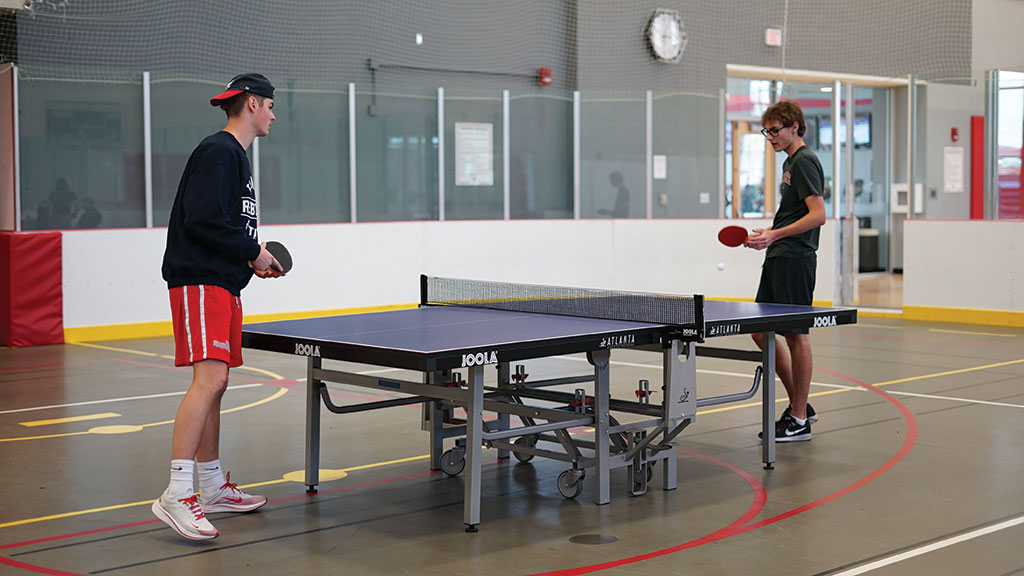
For instance, take a look at ISU’s Custom Fitness Programming. Valerie Deal, an associate director of Campus Recreation, explained they are able to customize 12-week fitness programs for groups to complete on their own time. There is a week-by-week guide and video demonstrations of each exercise or circuit. Two successful groups include Redbird Esports and ISU’s Big Red Marching Machine.
In addition, Campus Recreation has been hosting pop-up events across campus. Seibring noted that Housing shared engagement was lower in Fall 2021. As such, they got creative.
“We would go up to the Quad and bring out a bunch of hammocks, or we would do a knot tying clinic,” said Seibring. “Or we would go to a residence hall and do a meditation class. You just show up. There was no fee, no pre-registration. We were doing a lot of different pop-up events just trying to get students to become engaged.”
EXTRA CREDIT: Being creative with your programming can also be the small changes — from QR codes on the fitness floor to a wellness bucket list. Read it.
The fact is barriers come in as many shapes and sizes as people. What might not be a barrier for you is for someone else. “We have some spaces on our campus students think are really far away,” explained Seibring. “Some of us might laugh at them when they say that, but some students think that so again, trying to reduce the barrier is a goal of ours.”
Meeting students shouldn’t be the only goal of a campus rec department. As the past couple of years has shown Deal, this is an industry full of “do as we say not as we do” type of professionals. “We’ll run ourselves ragged to make sure everyone else has recreation well-being opportunities,” she said. “I think the last couple of years have taught us we can’t function at that capacity all the time.”
What it Truly Means to be Successful
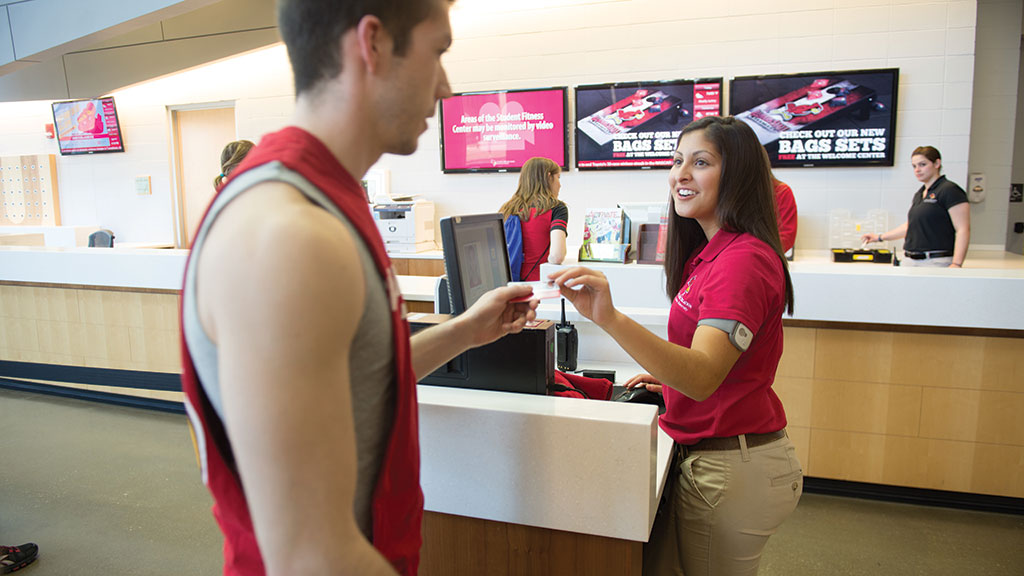
Deal shared the professional staff at ISU need breaks more than ever before, as well as the reassurance from leadership that they can take breaks. As such, the leaders of Campus Recreation must meet staff needs that have always been there but are now being highlighted.
“That time for them is important, and they should use their vacation time and they should take advantage of downtime between programs,” said Deal. “I think the other thing we’re seeing a lot is how much flexibility they want to feel they have or control of their own time. So, I think upper-level conversation should really be keeping that in mind.”
EXTRA CREDIT: Take a more in-depth look into ISU’s Student Fitness Center and McCormick Hall.
Finally, it’s about meeting staff in reality, meaning they know things don’t have to be perfect and success might look different than expected.
While Redbird Esports is considered thriving and successful, the program’s success would have looked much different with an open facility and full support in a non-COVId-19 era. But that’s where Pote said a mindset shift needs to take place. “For so long we had been focused on the numbers and who came and did we meet our outcomes and how did it all come together? That was not success in the COVID-19 environment,” said Pote. “We need to think about what it truly means to be successful in each of our programs.”
Perhaps, like Pote got a crash course in esports, the industry needs a crash course in redefining success. As the new normal continues to unfold, students and professionals alike need to be met where they are at. And being successful in that, as ISU has shown, may look different than you ever expected.
